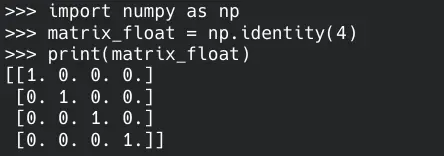Creating the Identity Matrix in Python
In linear algebra, an n-dimensional identity matrix is an n × n square matrix with 1s on the main diagonal and 0s elsewhere. This article explains how to NumPycreate an identity matrix using the Python programming language's library.
Creating the Identity Matrix in Python
NumPyIs a Python programming language library for creating large multidimensional arrays and matrices. pip3 install numpyInstall NumPythe library using the command to create the identity matrix.
The __data__ function of this library identity()takes a number as an argument and returns an array with the identity of that number of rows and columns. You can optionally specify the data type of the output. It uses __data__ by default float.
In the following example a integer4x4 identity matrix with data type is created.
import numpy as np
matrix_int = np.identity(4, dtype=int)
print(matrix_int)

If dtypethe argument is not specified, the matrix is created using floatthe data type.
import numpy as np
matrix_float = np.identity(4)
print(matrix_float)

For reprinting, please send an email to 1244347461@qq.com for approval. After obtaining the author's consent, kindly include the source as a link.
Related Articles
Convert a list to a set in Python
Publish Date:2025/05/08 Views:144 Category:Python
-
This tutorial demonstrates how to convert a list to a set in Python. Difference between List and Set Lists and sets are standard Python data types that store values in sequence. Python list stores comma separated values between
Remove the first element from a list in Python
Publish Date:2025/05/08 Views:172 Category:Python
-
This tutorial will discuss different ways on how to remove the first element from a list. pop() Remove the first element from a list using the pop() Method can remove an element from a specific index. We have to specify the index from which
Convert a list to lowercase in Python
Publish Date:2025/05/08 Views:112 Category:Python
-
Lists can be used to store multiple items in a single variable. In Python, we can create a list of strings by enclosing the different elements in the list in single or double quotes. This tutorial demonstrates how to convert a list of strin
Remove all occurrences of an element from a Python list
Publish Date:2025/05/08 Views:69 Category:Python
-
In Python, lists allow the same element to appear multiple times. Even though the value of an element may be the same as other elements, each element will have a different index. Using these index numbers, you can easily access any element
Convert hex to bytes in Python
Publish Date:2025/05/08 Views:101 Category:Python
-
Hexadecimal, often abbreviated to hex, uses 16 symbols (0-9, a-f) to represent values, in contrast to the decimal system's 10. For example, 1000 in decimal is 3E8 in hexadecimal. Being proficient in dealing with hexadecimal is essential for
b in front of string in Python
Publish Date:2025/05/08 Views:53 Category:Python
-
This tutorial will discuss the statement in Python b" . b" Using the statement in Python b" The notation is used to specify strings in Python bytes . In contrast to regular strings with ASCII characters, bytes a string is an array of byte v
How to Convert Integer to Binary in Python
Publish Date:2025/05/08 Views:130 Category:Python
-
This tutorial explains how to convert an integer to binary in Python. This tutorial also lists some sample codes to illustrate different ways of converting from int to binary in Python. bin() Convert Int to Binary in Python using In Python,
How to convert an integer to bytes
Publish Date:2025/05/08 Views:77 Category:Python
-
Converting an integer int to a byte bytes is the inverse of bytes converting a byte to an integer . Most of the to methods int described in this article are the inverse of the to methods. int bytes bytes int Generic method for converting in
How to convert bytes to int in Python
Publish Date:2025/05/08 Views:111 Category:Python
-
Bytes The data type has a numerical range of 0~255 (0x00~0xFF). A byte has 8 bits of data, that's why its maximum value is 0xFF. In some cases, you need to convert a byte or byte array to an integer for further data processing. Let's see ho

